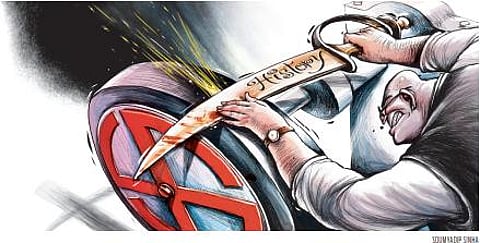

A nation’s past can be resurrected for multiple ends. Historical events of significance can help bridge the past with the present. History also teaches us lessons for the future, lest history repeats itself. The past can also inspire a nation in its march to glory. It can also be demonised. Monumental wrongs, symbols of violent deeds, and loot and plunder of historic significance cannot give legitimacy to contemporary acts of vengeance. A nation, in its onward journey, has to be very careful when analysing the past as it seeks to realise its destiny.
Vietnam became the theatre of the Cold War conflict, with the US militarily supporting the regime in Saigon to resist its unification and communist China alongside the USSR supporting Ho Chi Minh’s nationalist regime. The Vietnam War (1954–75) saw the loss of more than a million fighters and soldiers on both sides apart from two million civilians. The US eventually withdrew and the Socialist Republic of Vietnam was established. Time healed the wounds of the past. Today, Vietnam is considered a potential ally of the US with public opinion favourably inclined towards it. The past has been buried.
Yet another telling example relates to the regime of apartheid (separateness) in South Africa, which symbolised and perpetuated racial discrimination. Nelson Mandela’s sacrifice and the role of the Truth and Reconciliation Commission allowed democratic South Africa to heal the wounds of scarred generations. The white man, who chose not to emigrate, lives in harmony with the blacks. Events of the past are no more a cause for violence in South Africa. History is replete with such examples. The human tragedy of the Holocaust is still fresh in the minds of those living in Europe. Yet, Israel has chosen to live in peace with Germany. The history of Europe is a saga of conflicts, which ravaged populations for hundreds of years. Anglo-German and Anglo-French conflicts have not stood in the way of the European Union.
The wounds of the past cannot legitimise inflicting wounds on the living today as an act of vengeance. This is where India, as a nation, is going wrong. Recent events caused by the remarks of a BJP spokesperson have shown how volatile the situation can be and how fragile the peace that we seek to embrace is. Post-2014 marks a new chapter signifying the advent of a new era in the nation’s history. It is the beginning of revivalism, epitomised by a new sense of purpose; the coining of a new idiom, wherein the wrongs of the past provide legitimacy to the majority community to punish those belonging to the minority, living in the present. The rationale for this is deeply flawed.
One cannot judge facts of history by the standards that we embrace today. In medieval times, the power of the sword put emperors to death or kept them alive. The sword held sway to eliminate pretenders to the throne. Valour and the ability to inflict suffering on the enemy were attributes that kings admired. Brothers eliminated brothers without compunction. Blood, in a world bereft of moral values, was never perceived to be thicker than water. Intrigue and greed ran amuck. Revenge was considered a moral imperative.
Marauders in medieval times invaded India and plundered temples. These were symbols of wealth and dignity. The Deity in the temple gave strength to the king and if the king was to be defeated, the Deity too was looted. The king and the Deity had a symbiotic relationship that needed to be destroyed. Otherwise, victory would be incomplete. There are innumerable historical examples of Hindu Kings plundering temples and taking away the Deity when two Hindu kingdoms were at war. Attacking temples and places of worship had, invariably, nothing to do with religion. It was part of a culture in which destruction was a virtue. Human lives were of little value. Women were regarded as chattel, picked up by invaders as trophies of the victorious. The standards of morality and righteousness were embedded in the culture of violence.
We cannot judge such events in the context of present-day values. We can neither legitimise nor avenge them in one form or another. In either case, it would be a monumental blunder, and if a nation seeks to do that, it will result in a national disaster. Remember, the inhuman treatment of blacks, the legitimacy of the slave trade, and the standards of morality existing at that time. Slaves, bought and sold, were treated as property for the white man to exploit. These wounds run deep and any attempt to seek mileage out of them is the surest way to disaster.
The nation must remember how the East India Company, through intrigue and treachery, conquered India and ultimately transferred power to the Crown. India was won by treacherous acts both from within and without. The inhuman treatment of us Indians was the cause of the suffering of generations of those living here. When the white man walked on the street, we could not dare to cross the road. The indignity and inhumanity with which the white man treated us here are wounds that will not heal for years to come. Yet, today, we live in peace with the British. Revenge is not an option.
Religion is a cementing force. It also can become an intensely divisive force. When the priest makes politics a religious enterprise and the politician makes religion a political enterprise, this heady mix is no less than a million Molotov cocktails, disastrous for the future of our country. It is time we think of the present without re-opening the wounds of the past. Otherwise, the present will be forgotten and the past will destroy us.
Kapil Sibal
Senior lawyer and member of Rajya Sabha
(Tweets @KapilSibal)